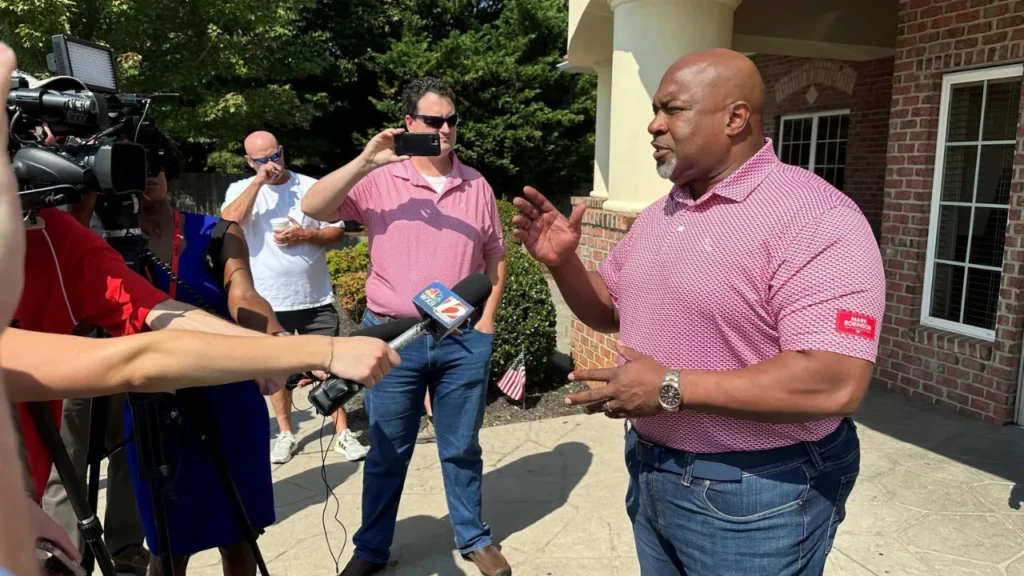Introduction
Mark Robinson has emerged as a significant figure in North Carolina’s political landscape since his election as the 35th lieutenant governor in 2021. A member of the Republican Party, Robinson’s dynamic presence and outspoken views have made him a key player, especially as he gears up for the 2024 gubernatorial election. This post delves into his background, political career, key policies, and what the future may hold for him and North Carolina.

Early Life and Background
Mark Robinson was born in Greensboro, North Carolina, and grew up in a modest household. His upbringing instilled in him a strong work ethic and a sense of community. Before entering politics, Robinson worked in various roles, including as a factory worker and a small business owner. Mark Robinson’s life experiences have shaped his views and fueled his passion for public service.
Political Career
Mark Robinson’s political journey began in earnest in 2018 when he gained national attention for his speech at a Greensboro City Council meeting opposing a proposed ordinance that would allow transgender individuals to use public restrooms corresponding to their gender identity. His passionate stance resonated with many voters, laying the groundwork for his future political ambitions.
In 2020, Mark Robinson ran for lieutenant governor and won, becoming the first African American Republican to hold this office in North Carolina. His campaign focused on traditional conservative values, personal freedom, and economic opportunity, themes that would continue to define his political identity.

As Lieutenant Governor
Since taking office, Robinson has been a vocal advocate for various issues:
- Educational Reform: Mark Robinson has championed efforts to improve educational outcomes in North Carolina. He supports school choice initiatives, arguing that parents should have the freedom to choose the best educational setting for their children. His focus on addressing educational disparities reflects his commitment to equity in education.
- Second Amendment Rights: A staunch defender of gun rights, Robinson has consistently advocated for the Second Amendment. He believes in empowering citizens to protect themselves and has opposed legislation perceived as infringing on these rights.
- Economic Development: Mark Robinson emphasizes job creation and economic growth as priorities. He advocates for reducing regulatory burdens on businesses, believing that a thriving economy benefits all citizens.
- Public Safety: In response to rising crime rates in some areas, Mark Robinson has pushed for policies aimed at enhancing public safety, including supporting law enforcement and advocating for tougher penalties for violent crimes.

2024 Gubernatorial Election
As the Republican nominee for the 2024 gubernatorial election, Mark RobinsonRobinso faces both challenges and opportunities. North Carolina has become increasingly competitive, with demographic shifts and changing political attitudes complicating the electoral landscape.
Key Issues for Robinson’s Campaign:
- Economic Recovery: In the wake of the pandemic, North Carolina’s economy is recovering, but challenges remain. Robinson’s focus on job creation and support for small businesses will be critical as he seeks to reassure voters of his commitment to economic prosperity.
- Healthcare: Access to affordable healthcare remains a pressing concern for many North Carolinians. Robinson will need to articulate a clear vision for healthcare reform that addresses both cost and access while appealing to a diverse electorate.
- Social Issues: Robinson’s conservative stances on social issues, particularly regarding education and gender identity, may energize his base but could alienate moderate voters. Navigating this delicate balance will be essential for his campaign’s success.

Connecting with Voters
Robinson’s ability to connect with voters is one of his strongest assets. His straightforward communication style and relatable background allow him to resonate with many constituents who value authenticity and transparency in politics. He often emphasizes his personal experiences and the lessons learned from them, framing his political beliefs as grounded in real-life challenges.
The Challenge Ahead
Despite his strengths, Robinson faces formidable opponents in the Democratic Party, who will likely capitalize on any perceived weaknesses. Engaging with a broad range of voters, including independents and moderates, will be crucial for his campaign. His challenge will be to articulate a vision for North Carolina that is inclusive and addresses the diverse needs of its residents.
Conclusion
Mark Keith Robinson’s journey from a grassroots activist to lieutenant governor and now gubernatorial nominee is a testament to his resilience and determination. His candidacy represents a significant moment in North Carolina politics, as the state grapples with key issues that will shape its future.
As the 2024 election approaches, Robinson’s ability to galvanize support, communicate effectively, and address the concerns of a changing electorate will determine not only his political future but also the direction of North Carolina itself. His journey is one to watch, as it embodies the complexities and opportunities present in today’s political landscape.
